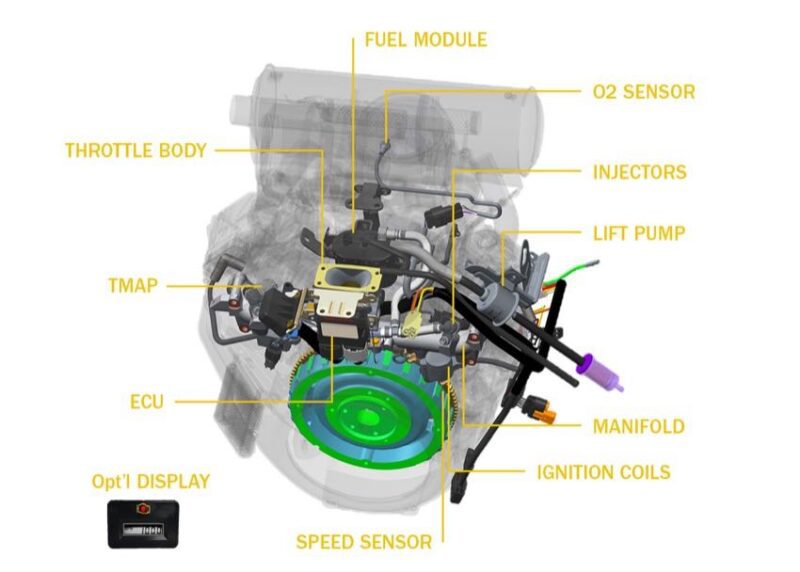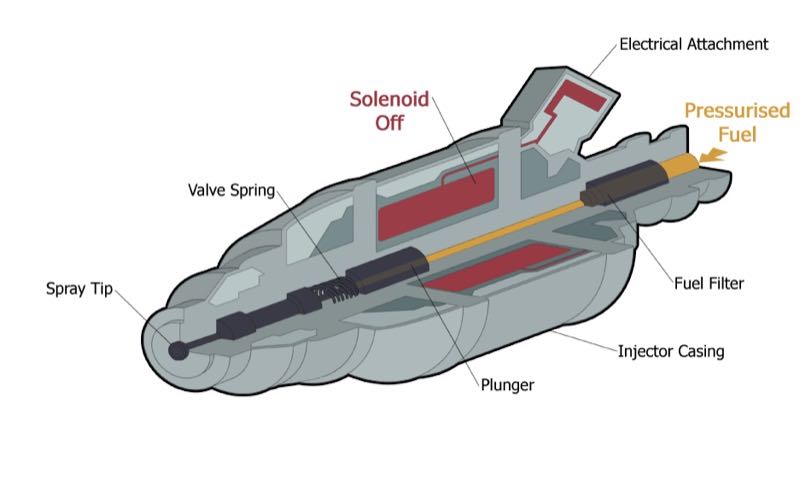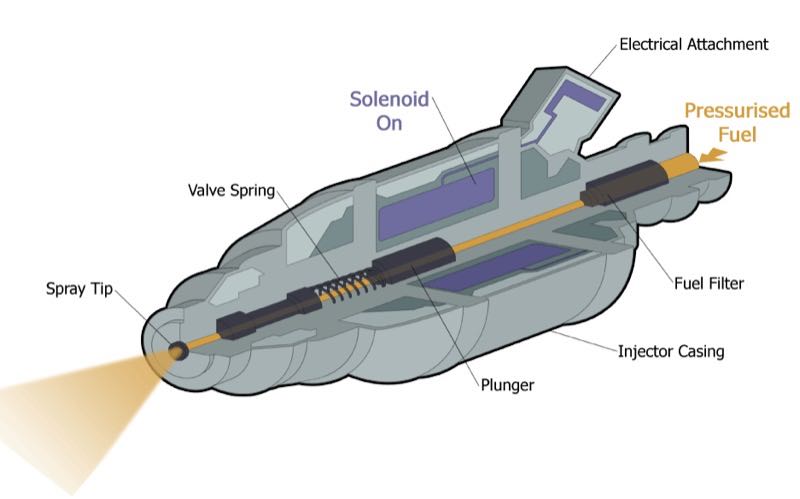EFI has become the automotive industry standard over the last 30 years. More recently, manufacturers of turf management equipment have started seeing the benefits of using EFI for small engines. Understanding how fuel injection or EFI works in small engines can help you decide whether to spend the additional money when selecting those engines for your next zero-turn mower.
EFI has six major advantages over a carburetor. We’ll cover each of them below.
Table of Contents
- Intro: How Fuel Injection Actually Works
- 1. How Fuel Injection Works to Increase Fuel Economy
- 2. EFI Gives You Improved Startup
- 3. Fuel Injection Compensates for High Altitude Compensation
- 4. EFI Provides Improved Load Governance
- 5. Electronic Fuel Inject Better Tolerates Stale Fuel
- 6. EFI Provides Improved Horsepower
- The Bottom Line
Intro: How Fuel Injection Actually Works
EFI stands for Electronic fuel injection. The technology has become more and more common on smaller engines—a good thing across the board. Rather than using a carburetor, which mixes fuel and air through a system of valves, a venturi tube, and suction, EFI injects fuel directly into either the engine manifold or the cylinder.

For something like a Vanguard engine that you may find in a Ferris mower or similar, the EFI system does much of the same. It works alongside the Engine Control Module (ECM), “tuning” the engine as it runs.
The system evaluates data from several engine sensors and makes decisions about how much fuel to provide on a cycle-by-cycle basis. It even sets the amount of spark for ignition and the timing. The result is an almost flawless start and operation in just about any temperature range. It also helps these engines run smoothly at high elevations (think Denver or Sweden). Lastly, it optimizes fuel consumption—helping lower your emissions in the process.
1. How Fuel Injection Works to Increase Fuel Economy
Fuel costs ebb and flow. Now that they’ve started inching up again, I probably don’t need to tell the commercial lawn guys how rising gas costs quickly cut into your profits! After labor costs, fuel presents the second biggest expense in the commercial turf market. That’s why fuel economy is so important.


Fuel injection works to increase fuel economy by running more efficiently than carbed motors. In fact, Briggs & Stratton has even developed a closed-loop EFI system that delivers up to 25% better fuel economy than an engine using a carburetor.
Delivering just the right amount of fuel on every cycle adds up quickly. Over the long haul, you can save some serious money on commercial products.
2. EFI Gives You Improved Startup
Sometimes, it’s imperative that you get your engine cranked as quickly as possible. EFI not only provides easy, chokeless startup, but how fuel injection works also makes both hot and cold restarts a whole lot easier. On the jobsite, when time is money, getting things moving quickly can dramatically improve your efficiency.
3. Fuel Injection Compensates for High Altitude Compensation
Since combustion relies on a mixture of fuel and oxygen, carburetors can struggle a bit in altitudes where the air becomes thinner. One of the advantages of EFI is how fuel injection works to automatically compensate for environmental conditions. That includes differences that occur when operating at different altitudes. Using EFI for small engines makes a ton of sense for lawncare Pros who find themselves working at higher altitudes.
4. EFI Provides Improved Load Governance
Between altitude variations, throttle settings, and any of the other variables, carburetors can struggle with supplying a consistent amount of power. EFI systems use an Engine Control Unit (ECU) to monitor engine speeds and load conditions.
The ECU adjusts the fuel delivery accordingly, ultimately maintaining consistent power and improving fuel economy. It kind of reminds us of how brushless motors work to supply extra power when needed when a tool comes under a heavier load.
5. Electronic Fuel Inject Better Tolerates Stale Fuel
As opposed to carburetors, how an electronic fuel injection delivery system works differs in the actual size of the fuel delivered. EFI systems atomize the gas into a fine spray.
This results in higher efficiency. More of the fuel sent to the cylinder actually gets burned. EFI also leaves less residual fuel behind in the system to turn gummy.
Using EFI for small engines delivers the benefit of mechanics having to spend less time and money rebuilding old, gummed-up carburetors!
6. EFI Provides Improved Horsepower
EFI systems consistently deliver higher levels of gross horsepower than carburetors. Again, carburetor performance relies on so many different variables, from throttle position to air concentration, that the performance can be erratic.
Upgrading to fuel injection for small engines evens out performance issues and provides more power or work.
The Bottom Line
The fact that the automotive industry has moved exclusively from carburetors to EFI is pretty telling. It’s also true that there’s a greater cost involved with EFI systems, at least initially. However, the benefits of using EFI for small engines all make a pretty compelling argument for upgrading. Improved fuel efficiency, reliability, power, and consistency should offset the initial cost. Plus, the added benefit of not having to rebuild a carburetor should go a long way toward saving money in the long run.



